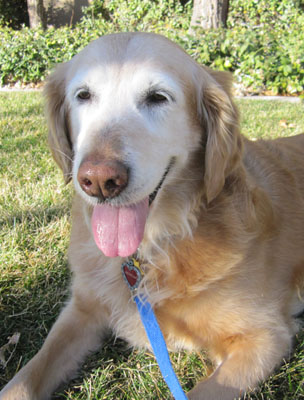Today was a roller coaster of emotions. In the morning, I found that Michelle had her tail tucked way under her belly. A bit unusual, but nothing too alarming.
After breakfast, I took Ickey and Michelle for a morning walk. Suddenly, Michelle begins swerving dramatically and walking like a drunken sailor. It’s hard for her to walk straight and her back legs look like they are giving out. We immediately head back home. Thankfully, Michelle’s legs hold out until we make it back safely. At home, she starts to have a very hard time getting up and her neck is noticeably tilted at an angle. Her left eye blinks rapidly and her whole posture just seems “off”. I know something is wrong, and start trying to piece everything together. I suspect she may have had a stroke.
Orderly and I take her in to the vet, and we both are terrified that our time with our our sweet old girl is nearing the end. We both cry as we are expecting the worst.
As the vet enters the room and sees how distressed we are, I relay Michelle’s symptoms: inability to walk straight, then inability to stand and walk at all, head tilt, one eye rapidly blinking. After carefully examining Michelle, the vet diagnoses her with Idiopathic or “Old Dog” Vestibular Disease. The vestibular system is composed of portions of the brain and ear and is responsible for maintaining a sense of balance. When something goes wrong with this system, it’s like being drunk on a rocky boat. Dogs with idiopathic vestibular disease have some combination of the following signs:
- A head tilt
- An unsteady gait, loss of balance, or falling over
- Circling in one direction
- Eyes rapidly moving from side to side, known as nystagmus
- Sudden vomiting
Michelle had three of the five symptoms. If the diagnosis is correct, Michelle’s symptoms should get better on their own within the next few days to 2 weeks. We are sent home with anti-nausea pills and advised to wait and see how her condition progresses. They don’t know exactly what causes “Old Dog” Vestibular Disease, but from my research online, it is not uncommon among older dogs. The good news is that while the syndrome looks very scary, it usually gets better all on its own. I am hopeful that this is truly what Michelle has as this would be the best case scenario, and wanted to share our experience should your dog exhibit these very alarming symptoms. As always, if you are every concerned about your pet, I recommend visiting (or at least calling) your vet’s office to discuss your situation.
In the meantime, we are using a long beach towel to support Michelle’s back legs as we help her outside to potty, stroking her soft fur as this appears to help her relax, and staying close to her side to let her know how very loved she is.
More information can be found here:
http://thebark.com/content/idiopathic-or-old-dog-vestibular-disease

